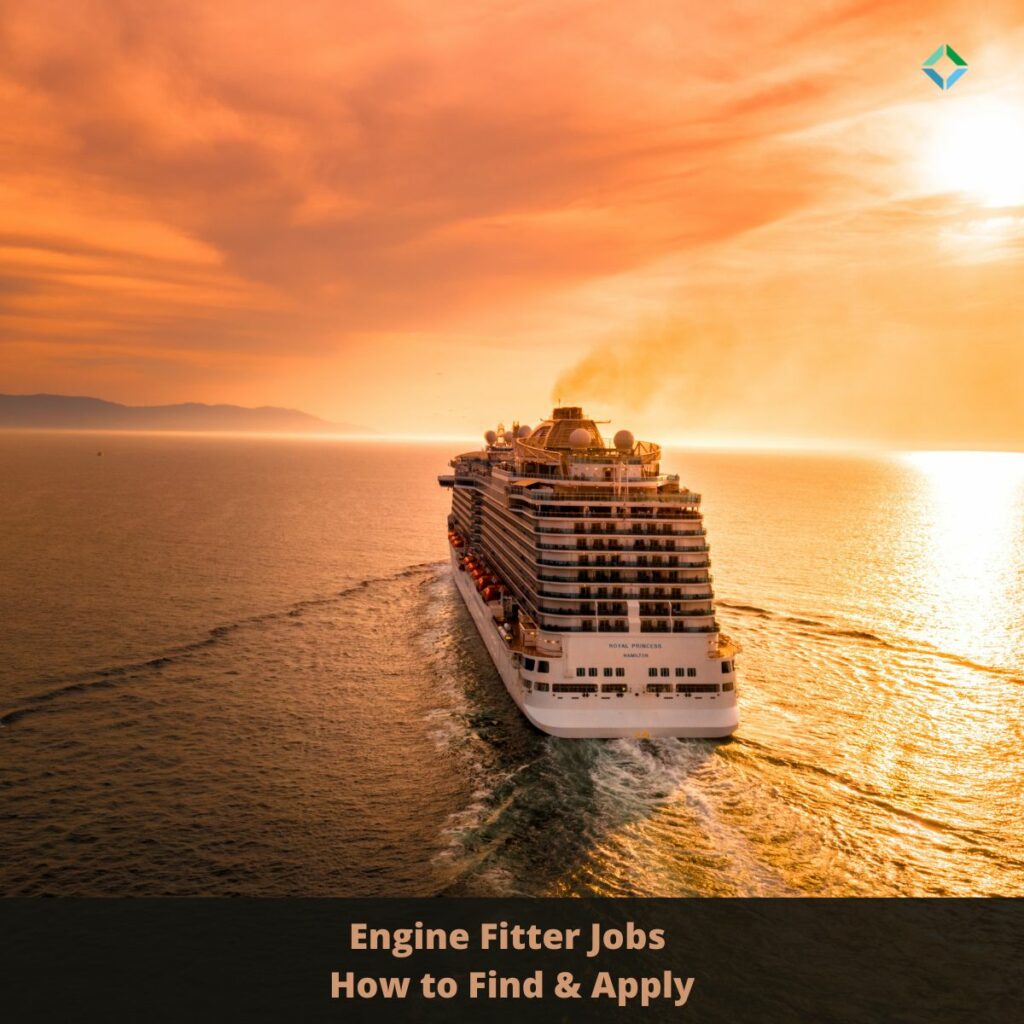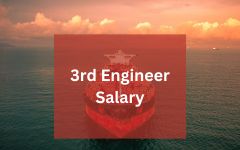Engine Fitter Jobs in the Maritime Industry: How to Find One and Apply
Engine fitters are an important part of the maritime industry. They are responsible for the maintenance, repair, and installation of engines and other mechanical systems on ships and boats. If you are interested in pursuing a career as an engine fitter in the maritime industry, there are several things you need to know. In this article, we will discuss how to find engine fitter jobs in the maritime industry and how to apply for them.
Who is an Engine Fitter
Engine fitters are skilled professionals who work in the maritime industry, specifically in the maintenance and repair of ships' engines. They are responsible for diagnosing and repairing issues related to the operation of ship engines, ensuring that they are in optimal condition for efficient and safe operation at sea.
Engine fitters work with a variety of equipment, including diesel engines, generators, pumps, and hydraulic systems. They use specialized tools and equipment to perform tasks such as replacing or repairing engine parts, conducting routine maintenance checks, and troubleshooting problems that may arise during a ship's voyage.
To become an engine fitter, individuals typically need to complete a formal apprenticeship or training program. This may include classroom instruction, on-the-job training, and testing to ensure that they have the necessary skills and knowledge to perform the job effectively.
Engine fitters may work for a variety of employers in the maritime industry, including shipping companies, shipyards, and repair facilities. They may work on various types of ships, including cargo ships, cruise ships, and oil tankers.
The role of an engine fitter is critical to the safe and efficient operation of ships at sea. They work to ensure that engines are functioning properly and that any issues are addressed promptly to avoid potentially dangerous situations.
For those interested in pursuing a career as an engine fitter in the maritime industry, there are a variety of job opportunities available. Job seekers can search for engine fitter jobs on online job boards, company websites, and through recruitment agencies. Networking within the maritime industry can also be a valuable tool for finding job opportunities.
When applying for engine fitter jobs, it is important to prepare a tailored resume and cover letter that highlight relevant skills and experience. Following application instructions carefully and preparing for interviews can also increase the likelihood of success in securing a job in this field.
Overall, engine fitters play a crucial role in the maritime industry, ensuring that ships' engines are operating safely and efficiently at sea. For those interested in pursuing a career as an engine fitter, there are a variety of job opportunities available both onshore and offshore, making it a potentially lucrative and rewarding career path in the sea job market.
Responsibilities of an Engine Fitter
Engine fitters are highly skilled professionals who play a critical role in the maintenance and repair of ship engines in the maritime industry. They are responsible for ensuring that ships' engines are functioning efficiently and safely while at sea, and for diagnosing and repairing any issues that may arise during a voyage.
The responsibilities of an engine fitter can vary depending on the type of ship and engine they are working on, as well as their level of experience and training. However, some common responsibilities of engine fitters include:
Conducting regular maintenance checks: Engine fitters are responsible for conducting routine maintenance checks on ship engines, including inspecting and replacing parts, checking fluid levels, and monitoring the performance of the engine.
Diagnosing and repairing problems: When an issue with the engine arises, engine fitters are responsible for diagnosing the problem and repairing it quickly and efficiently. This may involve replacing damaged or worn-out parts, adjusting engine settings, or conducting more extensive repairs.
Operating specialized equipment: Engine fitters use specialized equipment and tools to perform their job, such as diagnostic equipment, hand tools, and power tools. They must be trained in the proper use of these tools and equipment to ensure their safety and the safety of those around them.
Maintaining records: Engine fitters are responsible for maintaining detailed records of all work performed on the engine, including repairs, maintenance, and replacements. This information is used to ensure that the engine is functioning properly and to plan future maintenance and repairs.
Working with other crew members: Engine fitters work closely with other crew members on the ship, including engineers, mechanics, and electricians, to ensure that the ship's systems are functioning properly.
Adhering to safety protocols: Safety is a top priority in the maritime industry, and engine fitters must adhere to strict safety protocols to ensure their own safety and the safety of others on the ship.
In addition to these responsibilities, engine fitters may also be responsible for training and mentoring other crew members, overseeing the work of apprentices or junior engine fitters, and staying up-to-date with the latest industry developments and technologies.

Overall, engine fitters play a critical role in the safe and efficient operation of ships at sea. They must have a high level of technical expertise, strong problem-solving skills, and a commitment to safety in order to be successful in this demanding sea job.
Where to Find Engine Fitter Jobs in the Maritime Industry
For those interested in pursuing a career as an engine fitter in the maritime industry, there are several avenues for finding job opportunities. Here are some of the most common places to look for engine fitter jobs:
- Online job boards: Online job boards such asVesseljoin, Indeed, Glassdoor, and LinkedIn are excellent resources for finding engine fitter jobs in the maritime industry. These platforms allow job seekers to search for job openings based on location, experience level, and other criteria.
- Company websites: Many shipping companies, shipyards, and repair facilities have job postings on their websites. Job seekers can search for engine fitter jobs directly on these sites and apply online.
- Recruitment agencies: Recruitment agencies specializing in the maritime industry can be a valuable resource for job seekers looking for engine fitter jobs. These agencies often have connections with a wide range of employers and can help job seekers find positions that match their skills and experience.
- Industry events and conferences: Attending industry events and conferences can be a great way to network with other professionals in the maritime industry and learn about new job opportunities. These events often have job fairs or career centers where job seekers can meet with potential employers and learn about available positions.
- Networking: Networking with other professionals in the maritime industry can also be a valuable tool for finding engine fitter jobs. Joining industry groups and associations, attending trade shows and conferences, and connecting with industry professionals on Vesseljoin are all ways to build your network and stay informed about sea job opportunities.
When searching for engine fitter jobs, it is important to tailor your resume and cover letter to the specific job and employer you are applying to. Highlighting your relevant skills and experience, as well as your commitment to safety and attention to detail, can help you stand out from other applicants.
It is also important to be prepared for interviews by researching the employer and the job responsibilities in advance. This will help you answer questions more confidently and demonstrate your knowledge of the industry.
How to Find Engine Fitter Job Openings on Company Websites
One of the most effective ways to find engine fitter job openings in the maritime industry is to search directly on company websites. Here's a step-by-step guide on how to find engine fitter jobs on company websites:
- Identify potential employers: Start by identifying potential employers in the maritime industry. This could include shipping companies, shipyards, repair facilities, and other related businesses. Make a list of these companies and visit their websites.
- Look for career or job openings pages: Once on the company website, look for a "Careers" or "Job Openings" page. This is where the company will post their current job openings.
- Search for engine fitter job openings: Once you have located the job openings page, use the search function to search for "engine fitter" or related keywords such as "mechanical technician" or "marine mechanic." This will bring up any current job openings that match your search criteria.
- Read the job description: Once you have found a job opening that interests you, read the job description carefully. This will give you an idea of the specific responsibilities and qualifications required for the position.
- Apply online: If you meet the qualifications for the job, you can typically apply online through the company's website. Follow the instructions provided and be sure to include a customized resume and cover letter highlighting your relevant experience and skills.
When searching for engine fitter job openings on company websites, it's important to keep a few things in mind. First, not all companies will have current job openings posted on their website, so you may need to check back periodically or reach out to the company directly to inquire about job opportunities.
Second, it's important to tailor your application to the specific job and company you are applying to. This means customizing your resume and cover letter to highlight the skills and experience that are most relevant to the position.
Finally, it's a good idea to do some research on the company before applying for a job. This will help you understand their mission, values, and culture, which can be helpful during the application and interview process.
How to Apply for Engine Fitter Jobs in the Maritime Industry
Once you have found engine fitter job openings in the maritime industry, the next step is to apply for them. Here's a step-by-step guide on how to apply for engine fitter jobs in the maritime industry:
Prepare your application materials: Before you start applying for jobs, make sure you have all the necessary application materials ready. This should include a customized resume and cover letter that highlight your relevant experience and skills.
Read the job description carefully: Once you have identified a job opening that interests you, read the job description carefully. Make sure you understand the specific responsibilities and qualifications required for the position.
Tailor your application: Tailor your resume and cover letter to the specific job and employer you are applying to. Use keywords from the job description to highlight your relevant experience and skills.
Apply online: Most companies in the maritime industry require job applicants to apply online. Look for a "Apply Now" or "Submit Your Application" button on the job posting and follow the instructions provided. This typically involves filling out an online application form and attaching your resume and cover letter.
Follow up: After you have submitted your application, it's a good idea to follow up with the company to make sure they received it. This can be done through email or by calling the company's HR department.
Prepare for the interview: If you are selected for an interview, make sure you are well prepared. Research the company and the job, and practice answering common interview questions.
Accept or decline the job offer: If you are offered the job, take some time to carefully consider the offer. Make sure it meets your salary and benefit requirements, and that you are comfortable with the job responsibilities and working conditions. If you decide to accept the job, follow the company's instructions for accepting the offer. If you decide to decline the offer, be polite and professional in your response.






